We use cookies to enhance our website for you. Proceed if you agree to this policy or learn more about it.
- Essay Database >
- Essays Samples >
- Essay Types >
- Research Proposal Example

Information Technology Research Proposals Samples For Students
35 samples of this type
Do you feel the need to check out some previously written Research Proposals on Information Technology before you get down to writing an own piece? In this free database of Information Technology Research Proposal examples, you are provided with a thrilling opportunity to examine meaningful topics, content structuring techniques, text flow, formatting styles, and other academically acclaimed writing practices. Using them while composing your own Information Technology Research Proposal will definitely allow you to complete the piece faster.
Presenting high-quality samples isn't the only way our free essays service can aid students in their writing ventures – our authors can also create from point zero a fully customized Research Proposal on Information Technology that would make a genuine foundation for your own academic work.
Example Of Building Health Information Technology Workforce: Challenges And Strategies Research Proposal
Free research problem research proposal sample, research outline.
- Abstract - Introduction - Concept - Research problem - Research questions - Research objectives - Research justification - Limitations of the study - Assumptions - Scope of the study - Ethical considerations - Literature review - Research methodology
Introduction
Research proposal on women and new information technologies, home working mums and information technology.
Don't waste your time searching for a sample.
Get your research proposal done by professional writers!
Just from $10/page
Factors of E-Learning Influencing Student Knowledge Research Proposal
Research question.
What are Factors of E-learning influencing Students Knowledge?
Aims and objectives
The major aim of this study will be to determine E-Learning factors that influence the knowledge of students as far as management information systems and information technology is concerned. In order to realize this aim, the study will be aimed at achieving the following specific objectives:
- To determine E-Learning factors that affects students
- To establish the connection between student knowledge and E-Learning
- To determine how E-Learning factors affect student knowledge.
- To determine how negative E-Learning factors could be improved to facilitate student knowledge.
Problem Of Study Research Proposal Sample
Information technology on international banking performance.
THE IMPACT OF INFORMATION TECHNOLOGY ON INTERATIONAL BANKING PERFORMANCE: COMPARATIVE CASE STUDY ANALYSIS OF NIGERIA, UNITED KINGDOM AND BRAZIL BANKING INDUSTRY
INTRODUCTION
Why some business areas choose to work in isolation from it) research proposal.
Introduction 3 Review of Literature 3 Research Methodology 6 Rationale 6 Objectives 7 Research Question 7 Theories: Resource Based Theory 7 Research Design 7 Procedure 7 Data Collection 8 Data Analysis 8 Reliability 8 Ethical Issues 9 Discussion 9 Conclusion 9
References 10
Ait case study cover sheet research proposals example.
in Healthcare Systems Past Courses: Please list all course completed and currently taking. Remember that you must complete all prerequisites in order to register for a case study.
Implementation of Information Technology in Healthcare Systems
Good research proposal on problem description, implementation of information technology in healthcare systems – research proposal, free will technology rule the world research proposal example, free research proposal about gender awareness in information technology companies (7 pages), write by example of this operating system proposal- linux research proposal, free research proposal about data analysis and analytics research, the role of the senior level informatacist in the informational technology change, effective communication in the workplace: the relationship between employee performance and organizational communication research proposal samples, literature review, effective communication in the workplace: the relationship between employee performance and organizational communication research proposals example, free how to secure information in public entities research proposal sample, free bloomsburg university of pennsylvania research proposal sample.
Dr. David L. Soltz, President
Carver Hall 400 East Second Street
Bloomsburg, PA 17815-1301
e-commerce: the challenges with e-payments research proposals example, growth opportunities: example research proposal by an expert writer to follow, section 1: project introduction, subjectprofessor research proposal examples, customer relations management (crm), research proposal on technology in nursing, medical knowledge management: research proposal examples, research aim and objectives research proposal samples.
WHAT ARE THE MAJOR CHALLENGES THAT PANALPINA WILL HAVE TO OVERCOME AND THE CAPABILITIES THAT WILL HAVE TO DEVELOP TO MAINTAIN ITS LEADING POSITION AND THE RAPID PACE OF GROWTH
Windows Network Proposal: A Top-Quality Research Proposal For Your Inspiration
Research proposal on executive proposal researching and evaluating a security testing software, sample research proposal on windows network proposal, terrorists and computers: the evolution of the nature of terrorism research proposal samples, good research proposal on project plan inception.
{Author Name [first-name middle-name-initials last-name]} {Institution Affiliation [name of Author’s institute]}
Sample Research Proposal On The Impact Of E-Governance And The Role Of Human Resource Development In Improving The Organization’s Performance
Project description.
Company managers are faced with growing pressure to improve on the performances of their organizations. Given the high competitiveness of the business world today, achieving these objectives may at times be challenging to managers. This study sets out to determine the impact of e-governance and the role of human resource development in improving organizational performance. The study will seek to determine how managers can harness on the effective use of these vices in meeting their organizational performance objectives. The project is targeted at top managers and executives in both for-profit and non-profit organizations.
Current State of the Project
Free the fourth amendment and cybercrime research proposal sample, the negative effects of technology on the accounting profession research proposal examples, research proposal on international programming in the united states, ohio state medical center research proposal sample, executive summary, research proposal on the use of social networks by managers to achieve business standards, affiliated institute.
Abstract Capturing space in social media is a easy task, difficulty lies in capturing customer mindsets and their moulding their viewpoints about your business or product using the social media. Social Media has given a great opportunity to businesses but collecting distinct target groups under one roof who are open to any sort of communication and explore new things.
Research Proposal On Project Outline
Research proposal on traffic surveillance system image processing.
Password recovery email has been sent to [email protected]
Use your new password to log in
You are not register!
By clicking Register, you agree to our Terms of Service and that you have read our Privacy Policy .
Now you can download documents directly to your device!
Check your email! An email with your password has already been sent to you! Now you can download documents directly to your device.
or Use the QR code to Save this Paper to Your Phone
The sample is NOT original!
Short on a deadline?
Don't waste time. Get help with 11% off using code - GETWOWED
No, thanks! I'm fine with missing my deadline
Academia.edu no longer supports Internet Explorer.
To browse Academia.edu and the wider internet faster and more securely, please take a few seconds to upgrade your browser .
Enter the email address you signed up with and we'll email you a reset link.
- We're Hiring!
- Help Center

Download Free PDF
Sample Research Proposal On ICT

Students who study informational technologies have a chance to prepare a research paper on ICT and demonstrate their knowledge of the discipline. In order to do it they have to impress their professor that the topic is worth investigation with help of highquality logical research proposal. The topic is quite complicated and needs profound research, so students often need good help with the composition of a good proposal and join a great number of websites which contain free examples of research proposals on ICT prepared by professional writers. Unfortunately, it is extremely problematic to find a wellorganized sample, as a great number of such papers is of poor quality and prepared by amateurs, who are not the experts in the topics they describe. Still, if you manage to find a good model for writing, you will manage to complete the best proposal on your own. Information and communication technology (ICT) is one of the most perspective spheres nowadays, because information is even more valuable than money. In order to enable people create, exchange all kind of information (from pictures, and presentations to audio and video data) much has been done. Scientists, programmers have worked out various kinds of software, which makes the process of data exchange easier, faster and cheaper. Today people have understood the value and importance of ICT and a range of schools and universities based on training the professionals in this sphere are opened all over the world (mostly in the highly developed countries). IT Professionals are highly praised, because information rules the world and everybody understands it. Without the high level of IT, proper development of business and any kind of organization is impossible, because advertising, trade, data exchange – everything is regulated by IT. A successful research proposal on ICT should be logical, informative and convincing. If you manage to convince the professor that the topic is worth investigation, you will receive the right to investigate it deeply. So, prepare a strict structure and logically present all points you are going to research; present questions which can be treated like problematic ones and prove you can solve them effectively. Writing a research proposal of ICT projects read as much as possible about the question to know the topic better. Start from the history of IT, its development, describe the modern situation and present your own vision of the problem. Introduce whether something should be improved and offer how to do it effectively. In order to organize a wellcomposed proposal read free samples of research proposals on ICT in the Internet and borrow wise ideas of the professional writers for the creation of your own successful paper.
Related topics
- We're Hiring!
- Help Center
- Find new research papers in:
- Health Sciences
- Earth Sciences
- Cognitive Science
- Mathematics
- Computer Science
- Academia ©2024
- Free Samples
- Premium Essays
- Editing Services Editing Proofreading Rewriting
- Extra Tools Essay Topic Generator Thesis Generator Citation Generator GPA Calculator Study Guides Donate Paper
- Essay Writing Help
- About Us About Us Testimonials FAQ
- Information Technology Research Proposal
- Samples List
An research proposal examples on information technology is a prosaic composition of a small volume and free composition, expressing individual impressions and thoughts on a specific occasion or issue and obviously not claiming a definitive or exhaustive interpretation of the subject.
Some signs of information technology research proposal:
- the presence of a specific topic or question. A work devoted to the analysis of a wide range of problems in biology, by definition, cannot be performed in the genre of information technology research proposal topic.
- The research proposal expresses individual impressions and thoughts on a specific occasion or issue, in this case, on information technology and does not knowingly pretend to a definitive or exhaustive interpretation of the subject.
- As a rule, an essay suggests a new, subjectively colored word about something, such a work may have a philosophical, historical, biographical, journalistic, literary, critical, popular scientific or purely fiction character.
- in the content of an research proposal samples on information technology , first of all, the author’s personality is assessed - his worldview, thoughts and feelings.
The goal of an research proposal in information technology is to develop such skills as independent creative thinking and writing out your own thoughts.
Writing an research proposal is extremely useful, because it allows the author to learn to clearly and correctly formulate thoughts, structure information, use basic concepts, highlight causal relationships, illustrate experience with relevant examples, and substantiate his conclusions.
- Studentshare
- Research Proposal
Examples List on Information Technology Research Proposal
- TERMS & CONDITIONS
- PRIVACY POLICY
- COOKIES POLICY

Information Technology Project Proposal
Proposal maker.
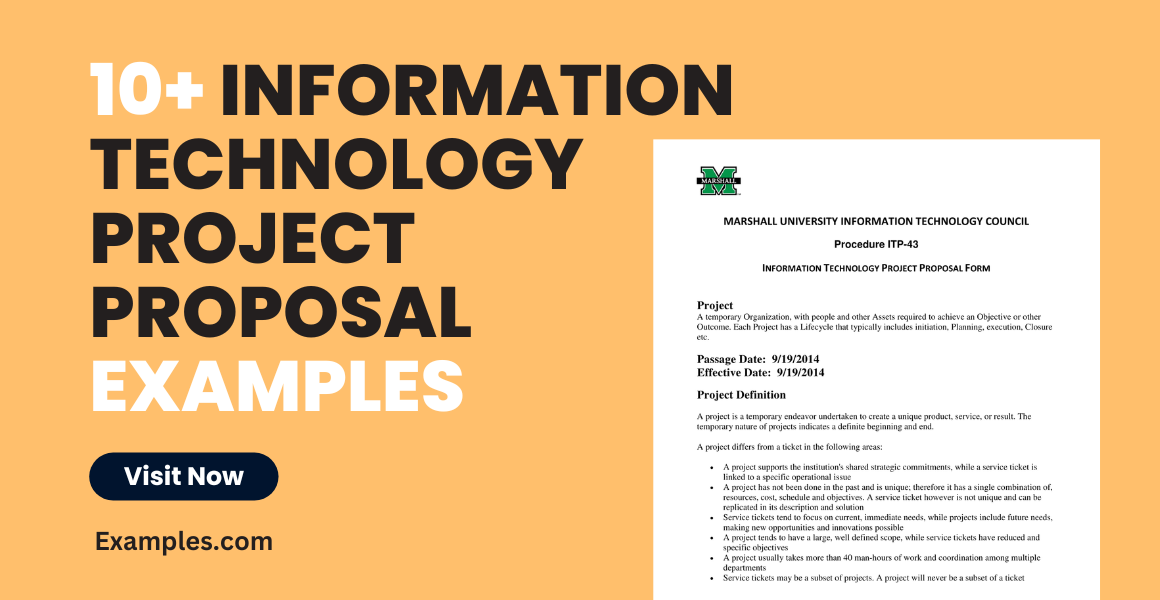
In a society run by mobile phones, smart TVs, and other Internet-capable devices, mankind has become dependent on the revolutionary ideas generated by those in the field of information technology. You may also see student project proposal examples .
- 9+ Engineering Project Proposal Examples
- 9+ Software Project Proposal Examples
While we can all agree that these developments have drastically changed our modern world for the better, getting these projects off the ground is a whole other story that has left many programmers, software engineers, and project managers scratching their heads. You may also like how to write a proposal for a project .
Software Project Proposal Example
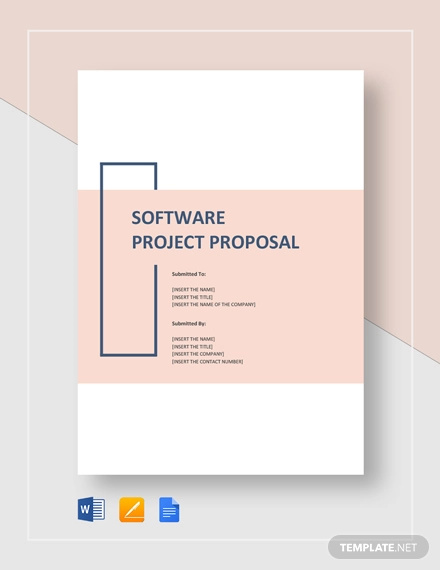
- Google Docs
Size: A4, US
Technology Proposal Template
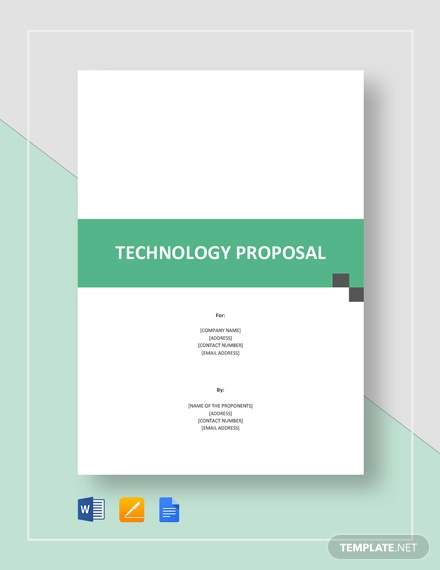
Blank Information Technology Project Proposal Template
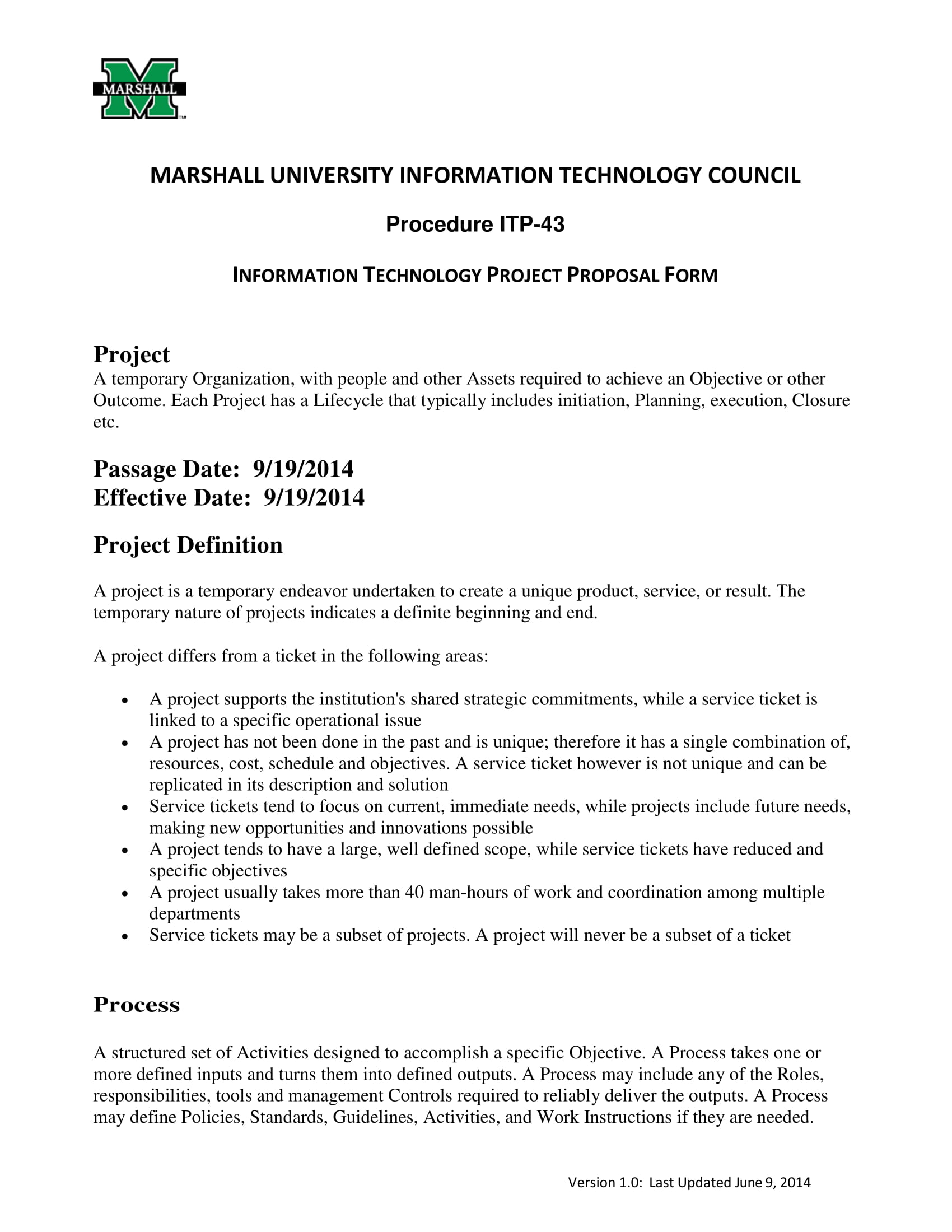
Size: 174 KB
Every innovative product goes through an intense process of planning, developing, testing, and implementing. But before a project can even make it past the first step, the project team must first make a simple proposal .
Information Technology Project Proposal Form Example
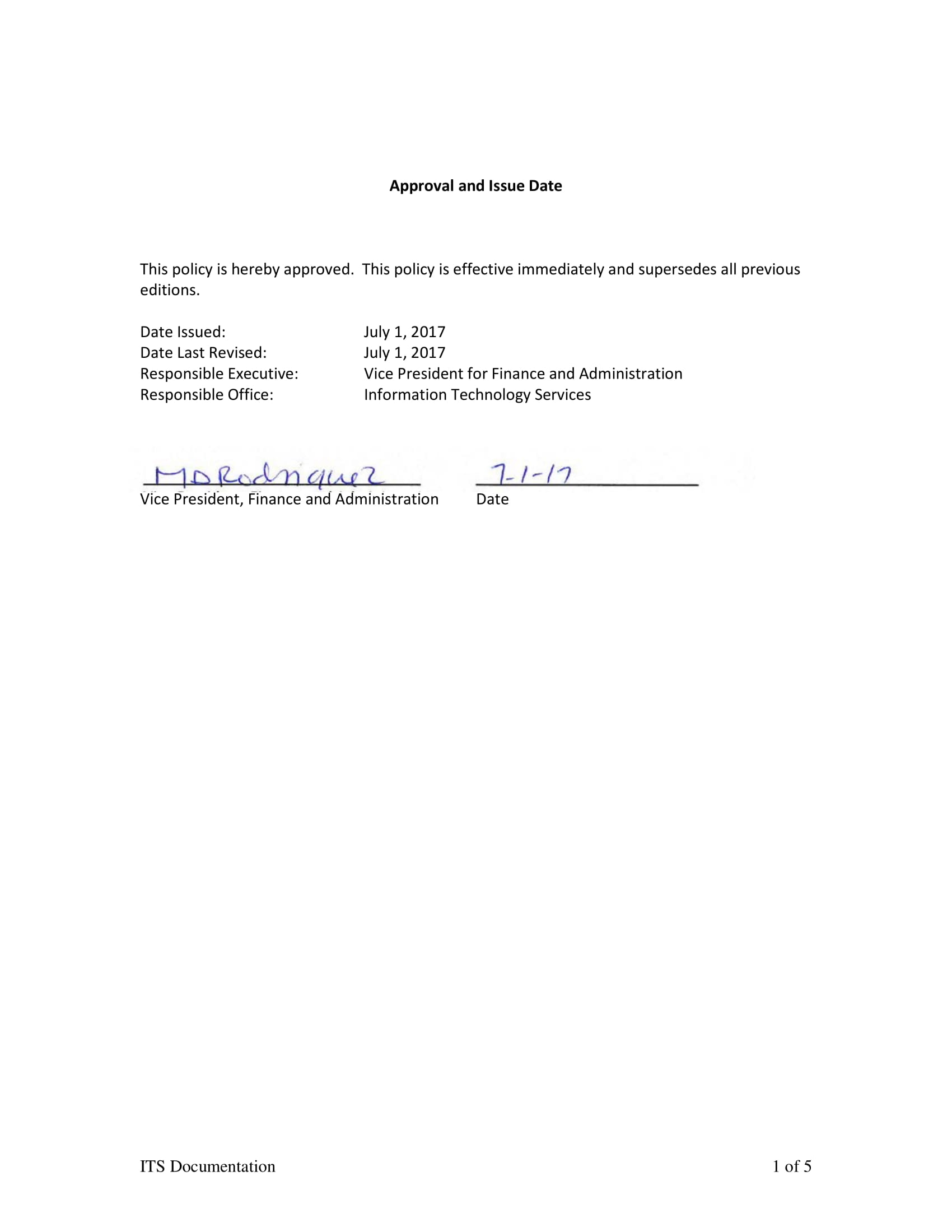
Size: 160 KB
Information Technology Project Proposal Review Example
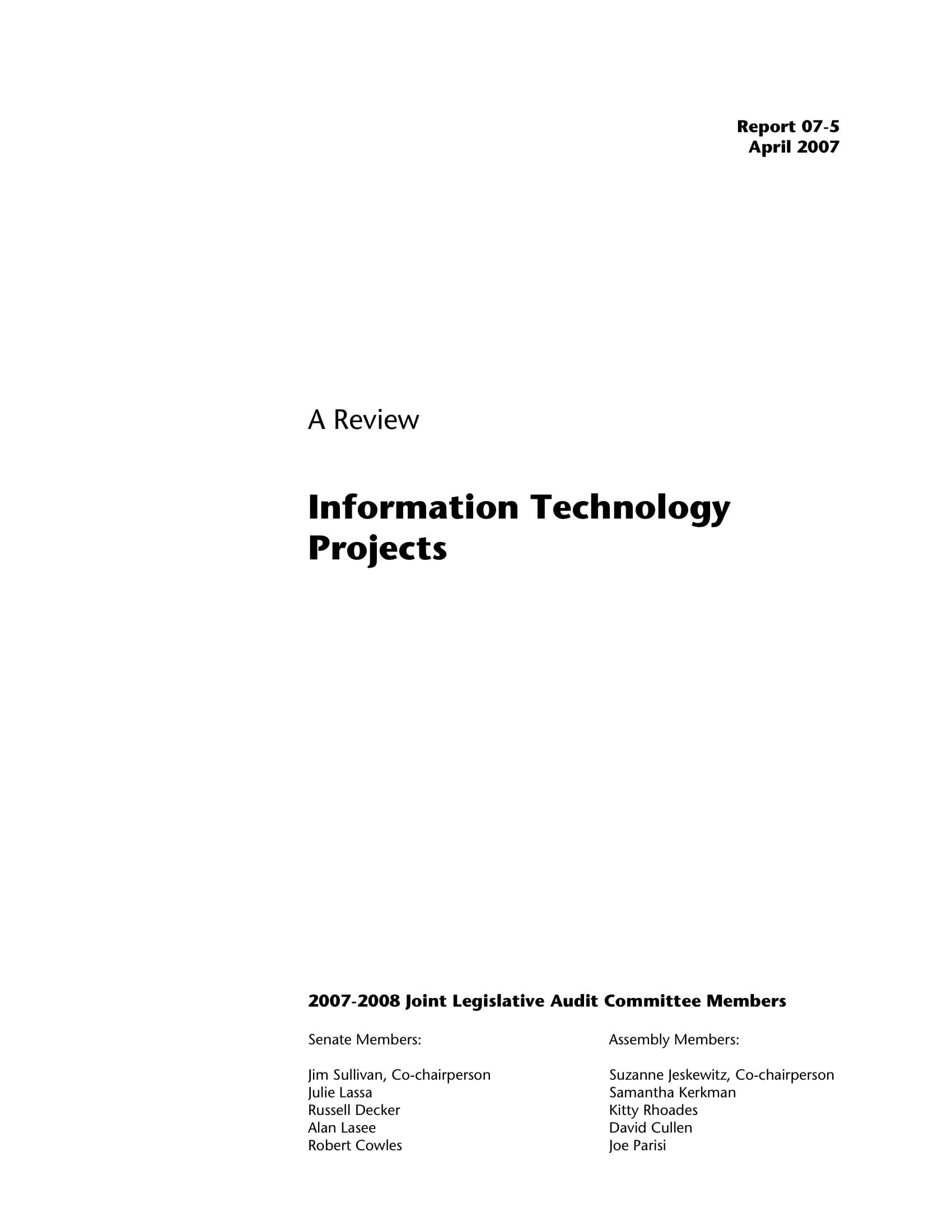
Size: 739 KB
Project proposals are essential in persuading clients or investors to provide the necessary funds for a project to be developed. They exist because investors want to make sure their resources are utilized wisely, and that the project team does not waste any more time and effort on a good-for-nothing idea. For this reason, crafting a well-written project proposal should be of top priority.
What Is an IT Project Proposal?
Projects in the field of information technology cover a vast variety of topics including computer software, electronics, database management, the Internet, and other telecommunications equipment. But because these projects can be risky and costly to develop, the project team is typically tasked to make a proposal for their ideas.
Information technology project proposals are often used in both an academic and business setting. Students taking programs or courses under information technology or its related fields are required to submit their project ideas in the form of a thesis proposal .
Here, panel members, which consist of professors and professionals in the field, are asked to evaluate whether the student’s proposed project is feasible enough to carry through. This allows students to apply what they have learned throughout the program period, and to assess if they are ready to take on the real world. You may also see project proposal outline examples .
IT project proposals are fairly common in the business world as well. Like most businesses these days, your IT business may be looking for more clients to partner with, or has been tasked to complete a series of internal projects. But in order to strike a deal with a client or get a project accepted, a business proposal is most likely needed.
Information Technology Project Proposal Template
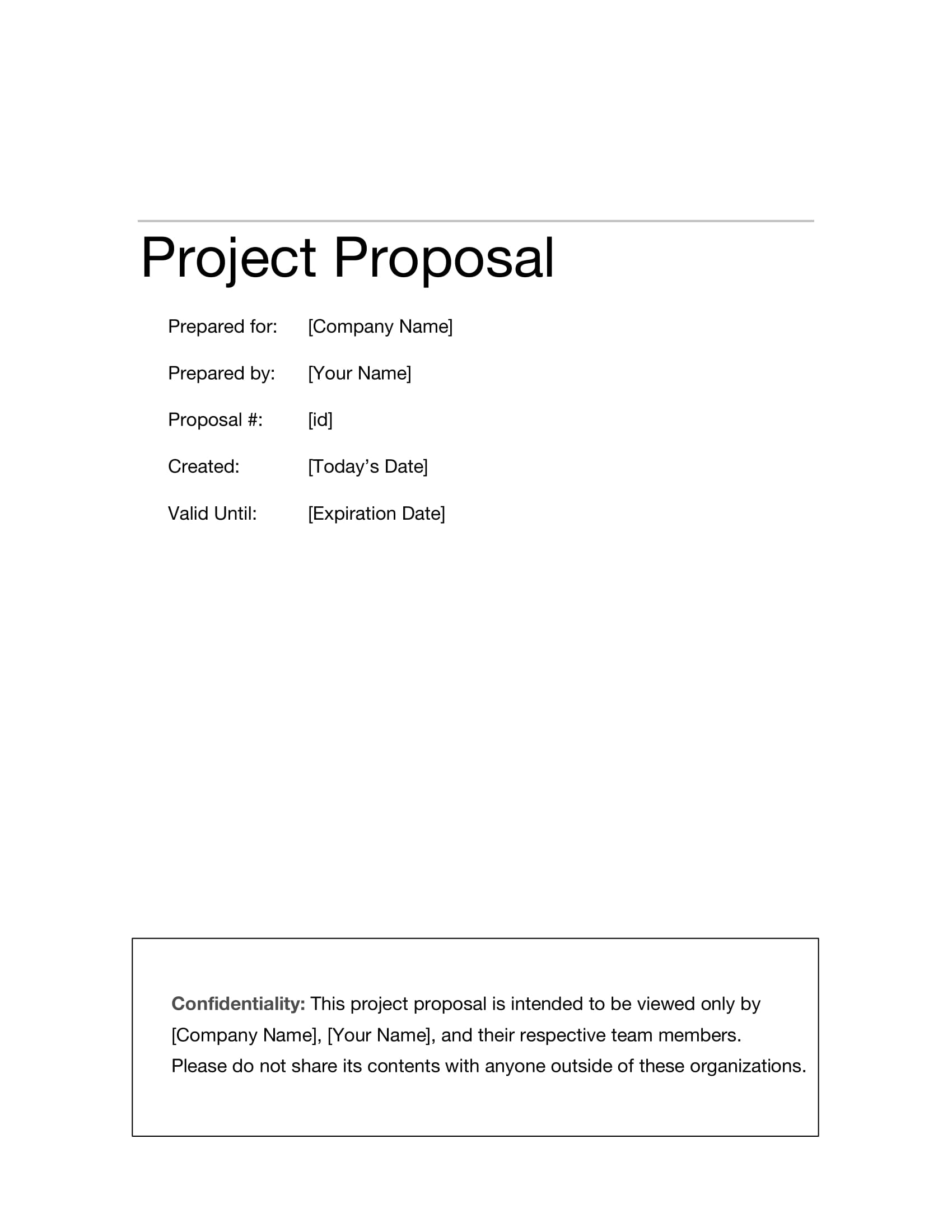
Size: 34 KB
Information Technology Services Project Proposal Example
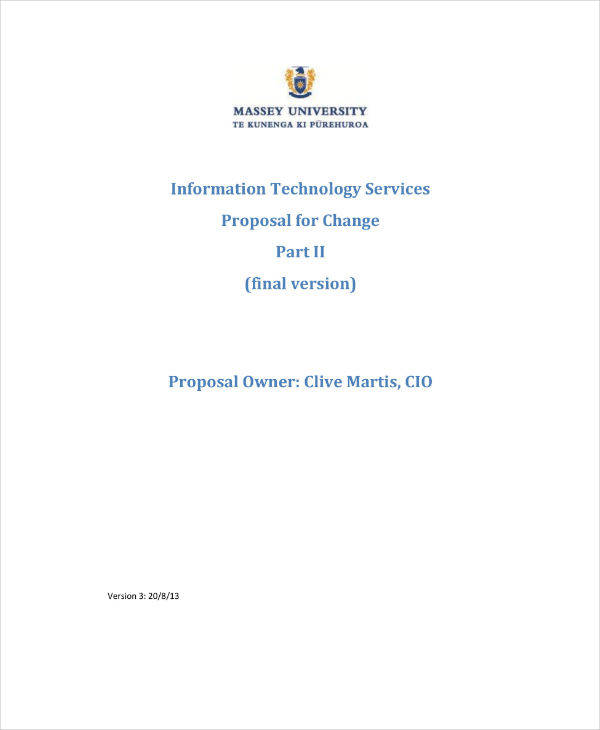
IT Project Proposal for ERP System Example
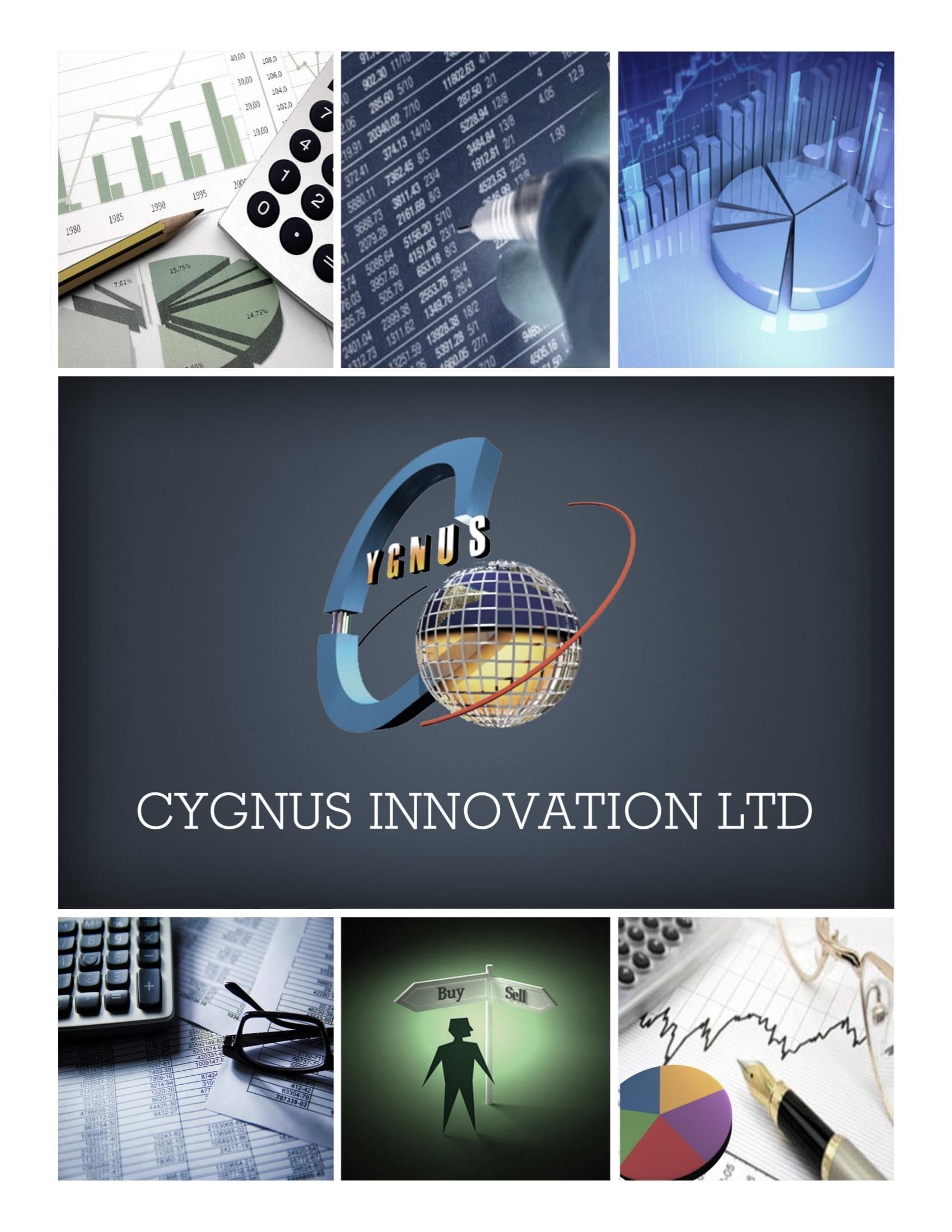
IT Project Proposal Template
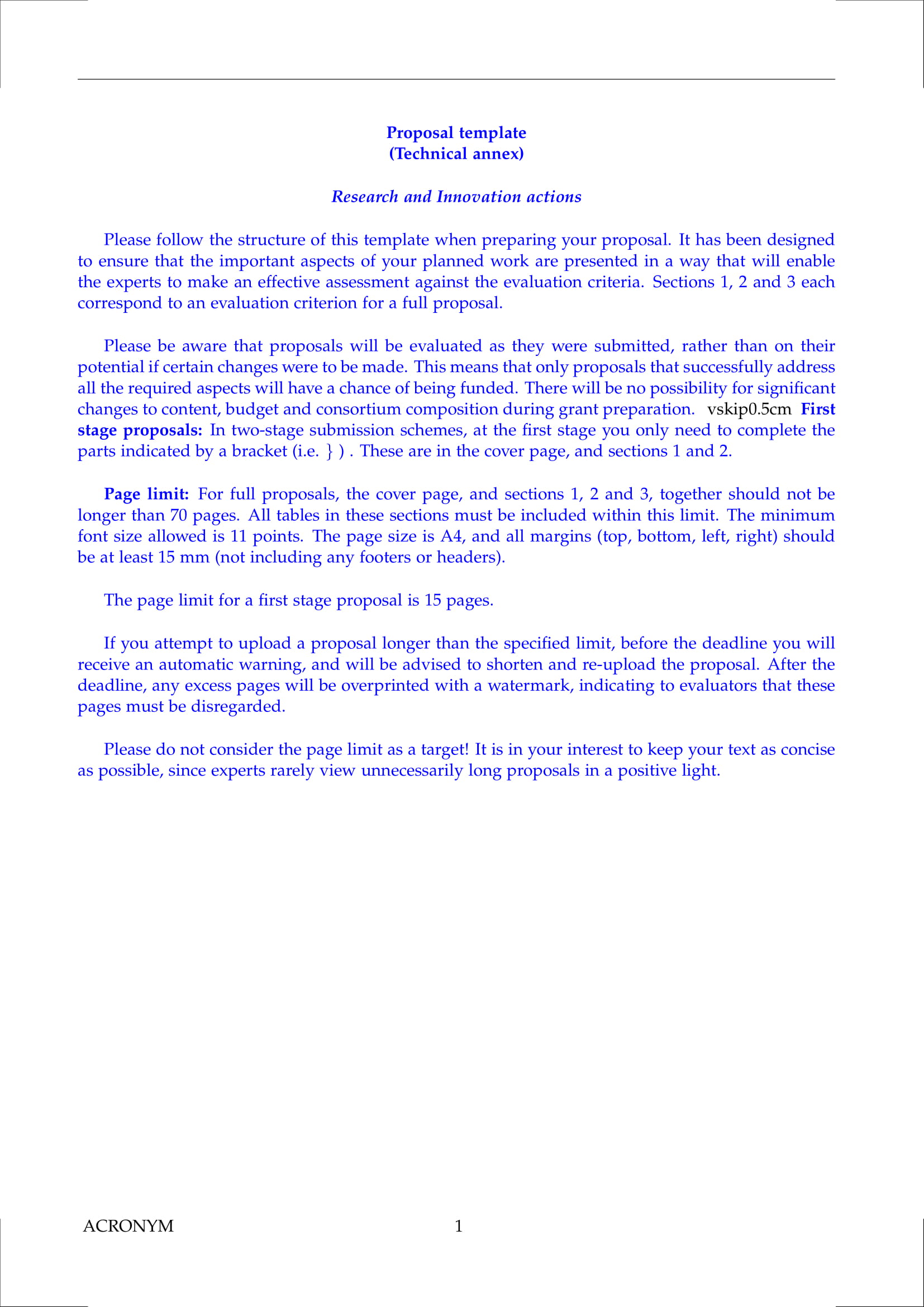
Size: 148 KB
6 Types of Project Proposals
Before you begin planning, you need to know what kind of proposal you’re making. This will help you determine how the proposal should be written, the elements to focus on, and the tone to use.
Listed below are the common types of proposals you’re likely to encounter:
1. Formally solicited
A formally solicited proposal is made in response to an official request for a proposal , also known as a Request for Proposal (RFP). Proponents can refer to the document to know exactly what the client wants, sometimes containing instructions on how the proposal should be prepared. These proposals often require a more structured approach, where proponents must respond directly to whatever has been relayed to them.
2. Informally solicited
Informally solicited project proposals are quite similar to formally solicited ones, except that the information that they are based on isn’t provided in a specific document.
This makes it a lot harder to create as the content of the general proposal could be based on a conversation rather than a set of specified details, goals, deliverables, and potentially even methods. It requires a lot more work to complete, which requires the utmost cooperation of each project team member. You might also be interested in market research proposal examples .
3. Unsolicited
With unsolicited project proposals, though they may not have been asked for, they can still offer a ton of value for the proponents and the prospects alike. They are a lot more persuasive than normal, which is why it is necessary to gather more evidence to prove that the project is worth investing on. You may also see service proposal examples .
4. Continuation
These aren’t exactly your typical kind of proposals. Instead, they are used to remind clients of a project that was previously approved by reporting on its progress, any potential changes, and a permission for the project team to continue as is. Continuation proposals are usually reserved for requesting additional funds as the team enters a new phase in the project’s development. Take a look at student project proposals too.
Much like a continuation proposal, renewal proposals are made to show an audience why a project is valuable to a given cause, along with why it should be continued. This will help determine whether a project should be terminated or pursued. In this document, the proponents must weigh up the return of benefits with the resources essential to the practice for clients to consider. You may also like research proposal examples .

6. Supplemental
The primary aim of a supplemental project proposal is to be able to justify the extra resources for a project (beyond what was originally proposed), and provide an update on the estimated costs (and sometimes time) for the project to be completed. This could either act as an extension to the original document to widen its scope, or a solution to a certain problem that has affected the project’s development. You can also check out capital project proposals .
Management System IT Project Proposal Example
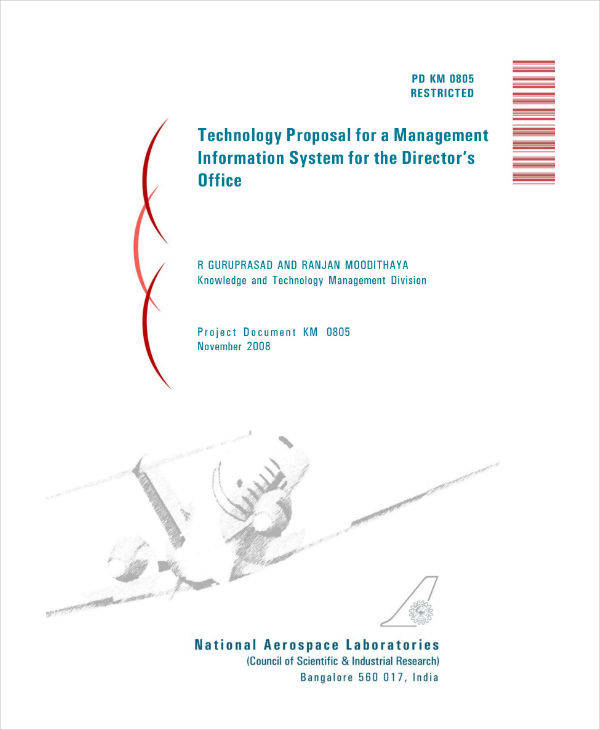
Masters in IT Project Proposal Template
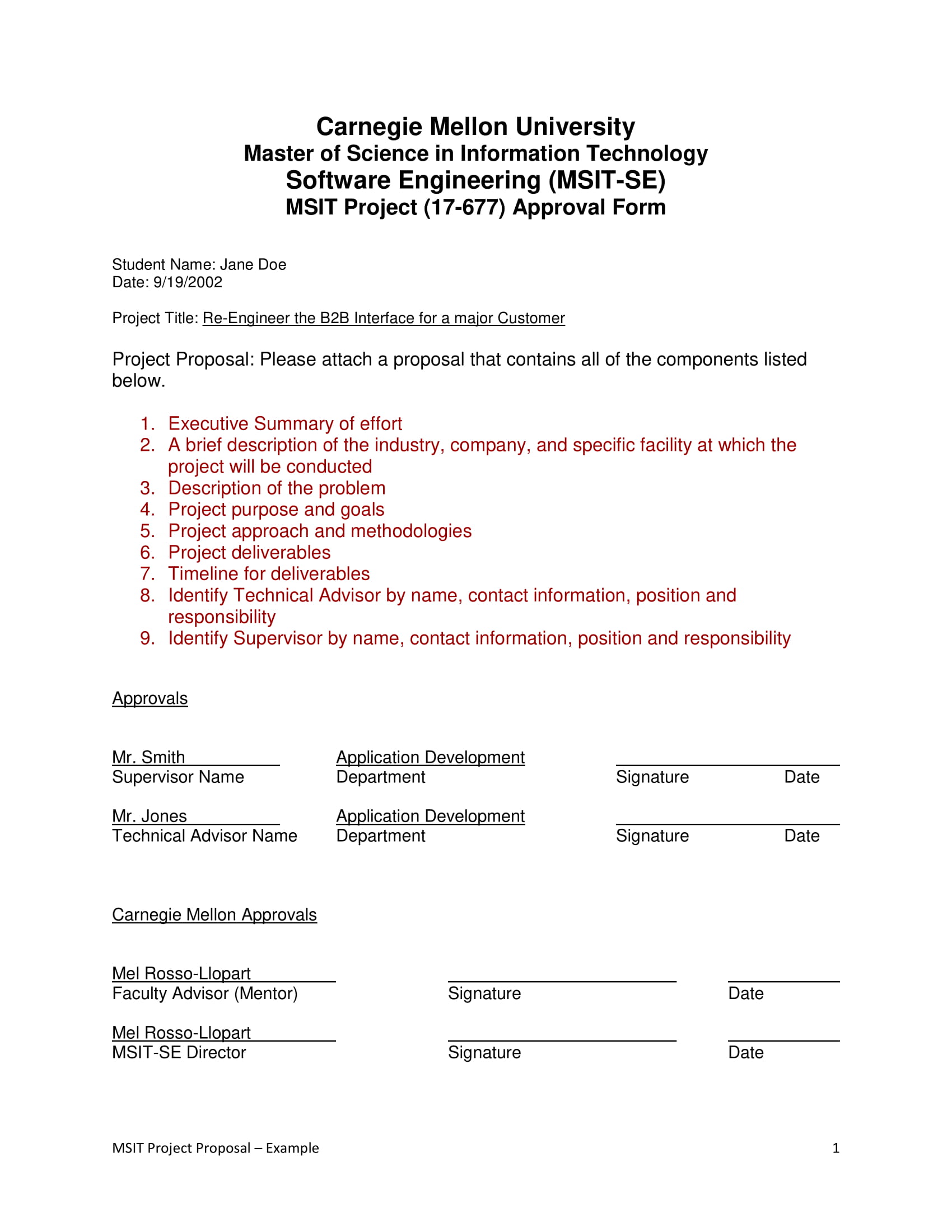
Size: 77 KB
Web Portal Information Technology Project Proposal Example
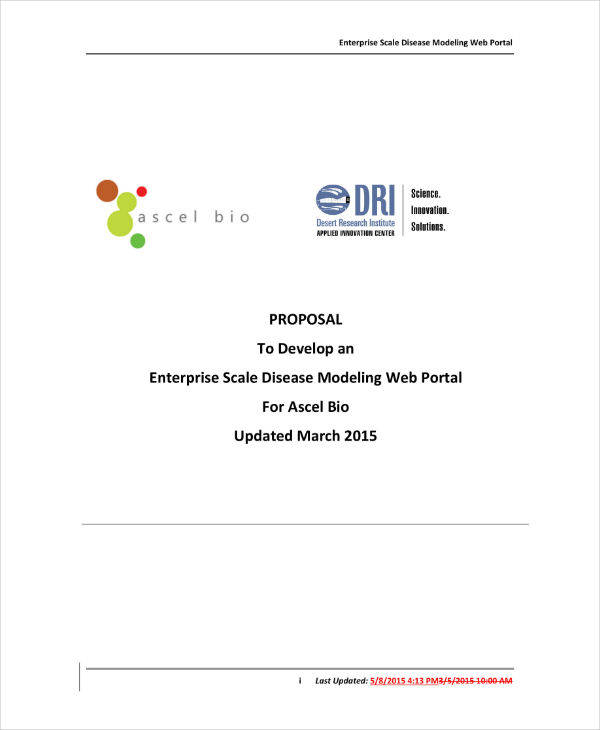
Size: 558 KB
Simple Tips for a Successful Project Proposal Defense
After you have written your proposal, you’re faced with the overwhelming task that many proponents fear the most: defending it.
The outcome of a project proposal defense will determine whether the project team can push through with their ideas or not. This may be the foremost step in the process, but it’s also the most critical. That being said, here are five useful tips to help you through this time:
1. Determine expectations.
Most panelists (also known as the review board) set out a criteria of what they expect proponents to present during the defense. These specific expectations serve as your guide to determining what to present and how they should be presented. You may also see
Say for example, your panelists might want you to prepare a slide show presentation that outlines your proposal. They would also want you to present your proposal within a specified time frame, before they begin raising questions and concerns in regards to your project. You might be interested in action research proposals as well.
2. Prepare for panel questions and formulate answers.
The Q&A portion is the most critical part of the defense. This is where any questions or misunderstandings must be settled before the review board can finalize their decision. Questions usually cover the what, why, when, where, and how of the actual project, but it is possible for the panel to go beyond the basics. Some panel members even look for possible loopholes in your professional proposal , especially for areas that weren’t explained properly.
3. Study your RRL.
The review of related literature contains a series of publications that are similar to yours. Here, studies and researches conducted by other authors are used as inspiration to craft your project proposal. You need to consider how you can apply what you have learned from those to the current proposal, and how they may affect the development of your own. You can check out final year project proposals also.
4. Maintain eye contact.
Body language says a lot about what runs through your mind. You need to be confident with your basic proposal , and proper posture and good eye contact is sure to send the right message.
Maintaining eye contact is a great way to keep your audience engaged. It shows that you believe in the proposed project and that you’re confident that the desired goals would be achieved as planned.
5. Make an outline of your project.
When presenting the proposed project, it’s proper etiquette to provide a summary of the entire document in a clear and concise manner. This means that you are not expected to explain the whole proposal, just the statement of what you want to do and how you plan to do it. Make sure to keep your project proposal outline brief and to the point for better comprehension. A timetable in the form of a Gantt chart , as well as an estimated budget to accomplish each deliverable, should be provided as well.
Writing a project proposal is a grueling task that requires careful research and analysis to complete. Because of this, proponents must adhere to the ideal format and language for the type of standard proposal they are making. So if you find yourself in need of a proposal for an information technology project, you can refer to these tips and examples to guide you.
Text prompt
- Instructive
- Professional
Generate a proposal for a new school recycling program
Compose a proposal for a school field trip to a science museum.
Information Technology Thesis Topics

450 Information Technology Thesis Topics and Ideas
Information Technology is one of the fastest-evolving fields, driving innovation across industries and reshaping how society functions. As technology advances, so do the challenges and opportunities for research in areas like artificial intelligence, cybersecurity, blockchain, and web development. This comprehensive list of 450 information technology thesis topics is divided into 15 categories, offering students a wide range of choices for their research. The topics reflect current issues, recent trends, and future directions in IT, providing an excellent foundation for meaningful and impactful thesis work.
Academic Writing, Editing, Proofreading, And Problem Solving Services
Get 10% off with 24start discount code, 1. artificial intelligence thesis topics.
- The role of AI in automating customer service: A case study on chatbots.
- Ethical considerations in the development of AI-driven healthcare solutions.
- AI-based predictive maintenance in manufacturing industries.
- The impact of AI on decision-making processes in finance.
- Enhancing cybersecurity using AI-powered threat detection systems.
- The role of AI in improving personalized learning experiences in education.
- Investigating the limitations of natural language processing in AI communication.
- AI-based facial recognition systems: Ethical implications and privacy concerns.
- The role of reinforcement learning in optimizing robotic process automation.
- AI in climate change prediction models: Enhancing accuracy and forecasting.
- Exploring the impact of AI on supply chain management optimization.
- Autonomous vehicles: How AI is transforming transportation.
- AI-driven fraud detection systems in banking and finance.
- The integration of AI in smart cities for energy management.
- AI’s role in enhancing the precision of medical diagnoses.
- AI and creativity: How machine learning is generating art and music.
- The future of AI-powered virtual assistants in personal and professional settings.
- AI in e-commerce: Enhancing product recommendations using machine learning algorithms.
- The impact of AI on employment: Exploring job displacement and creation.
- AI-powered language translation systems: Current capabilities and future potential.
- AI in sports analytics: Improving performance and strategy in professional sports.
- The role of AI in automating repetitive tasks in software development.
- AI-based models for predicting stock market trends.
- AI’s potential to improve mental health diagnosis and treatment.
- AI in video game development: Enhancing gameplay experience using machine learning.
- The role of AI in automating transportation logistics.
- AI and cybersecurity: How AI is transforming data protection and threat detection.
- The impact of AI on personalized marketing strategies in digital advertising.
- AI’s role in improving voice recognition systems and smart home devices.
- Exploring the ethical use of AI in autonomous weapons systems.
2. Augmented Reality Thesis Topics
- The impact of augmented reality in enhancing online shopping experiences.
- Exploring the role of augmented reality in medical training and simulations.
- The use of augmented reality in improving military training programs.
- Augmented reality in real estate: Revolutionizing virtual property tours.
- The role of AR in boosting engagement in digital marketing campaigns.
- AR-based educational tools for enhancing student learning outcomes.
- The potential of AR in improving tourism experiences with virtual guides.
- Augmented reality in interior design: Creating virtual spaces before building.
- Investigating the use of AR in automotive design and prototyping.
- The role of AR in advancing virtual conferences and remote work solutions.
- Augmented reality gaming: How AR is transforming the gaming industry.
- The impact of AR on enhancing museum and art gallery experiences.
- The role of AR in improving consumer engagement with product packaging.
- AR in architecture: Visualizing buildings in real-time environments.
- The future of AR in retail: Virtual fitting rooms and product try-ons.
- Augmented reality as a tool for enhancing patient care in healthcare settings.
- The impact of AR on enhancing customer service experiences.
- AR in urban planning: Visualizing city developments before construction.
- The potential of AR in enhancing interactive advertising experiences.
- AR-based training programs for improving employee performance in industrial settings.
- The role of AR in enhancing the virtual tourism industry.
- AR for cultural preservation: Bringing historical sites to life.
- Augmented reality in enhancing sports training and fan engagement.
- AR in engineering: Visualizing complex mechanical systems before manufacturing.
- The potential of AR in improving navigation systems for drivers and pedestrians.
- Investigating the use of AR in the entertainment industry for immersive experiences.
- The impact of AR on improving the safety of workplace environments.
- AR in enhancing live event experiences: Concerts, sports, and theater.
- The role of AR in revolutionizing educational tools for students with disabilities.
- Exploring the future of AR in home automation and smart devices.
3. Blockchain Technology Thesis Topics
- The role of blockchain in improving the transparency of supply chain management.
- Investigating the potential of blockchain in enhancing data privacy and security.
- Blockchain technology in healthcare: Revolutionizing patient data management.
- Exploring the impact of blockchain on transforming the finance industry.
- The role of blockchain in reducing fraud in online transactions.
- Blockchain-based voting systems: Ensuring transparency in elections.
- The use of blockchain in creating decentralized digital identities.
- Investigating the impact of blockchain on the development of smart contracts.
- The potential of blockchain technology in improving cybersecurity.
- Blockchain in agriculture: Enhancing food traceability and sustainability.
- Exploring blockchain’s role in protecting intellectual property rights.
- The future of blockchain in enabling decentralized social media platforms.
- Investigating the impact of blockchain on digital copyright protection.
- Blockchain in real estate: Transforming property transactions and ownership.
- The role of blockchain in enhancing digital voting systems’ security and accuracy.
- Investigating blockchain technology’s role in combating financial crimes.
- The use of blockchain in improving supply chain logistics and transparency.
- Exploring the potential of blockchain in enabling peer-to-peer energy trading.
- Blockchain in education: Revolutionizing credential verification systems.
- Investigating the integration of blockchain in IoT for secure data transmission.
- The impact of blockchain on cross-border payments and remittances.
- Blockchain and government: Enhancing transparency in public services.
- Exploring the role of blockchain in reducing corruption in developing countries.
- Investigating the scalability challenges of blockchain technology.
- Blockchain’s role in improving accountability in nonprofit organizations.
- Exploring the potential of blockchain for decentralized cloud storage systems.
- Investigating blockchain’s application in protecting personal privacy in the digital age.
- The role of blockchain in revolutionizing the financial services industry.
- Exploring blockchain’s potential to disrupt the insurance industry.
- Blockchain-based crowdfunding: Enhancing security and trust in online fundraising.
4. Cloud Computing Thesis Topics
- Investigating the role of cloud computing in enabling remote work and collaboration.
- The impact of cloud computing on reducing IT infrastructure costs for businesses.
- Exploring the potential of cloud computing in enhancing disaster recovery systems.
- The role of cloud computing in supporting big data analytics.
- Cloud-based solutions for improving healthcare information systems.
- Investigating the security challenges associated with cloud computing.
- The role of cloud computing in enabling IoT applications and services.
- Exploring the impact of edge computing on the future of cloud services.
- Investigating the role of cloud computing in improving e-commerce platforms.
- Cloud computing for startups: Reducing operational costs and scaling efficiently.
- The impact of cloud computing on enabling AI-driven applications.
- Investigating the environmental impact of large-scale cloud data centers.
- The role of cloud computing in transforming educational institutions.
- Exploring the integration of cloud computing with blockchain technology.
- Cloud computing in retail: Enhancing customer experience through data analytics.
- Investigating the role of cloud-based machine learning models in predictive analytics.
- The impact of hybrid cloud solutions on enterprise IT strategies.
- Exploring the future of multi-cloud environments in optimizing business operations.
- The role of cloud computing in supporting telemedicine and remote healthcare.
- Investigating the security risks of cloud-based SaaS (Software as a Service) platforms.
- Cloud computing and data privacy: Navigating legal and regulatory challenges.
- The role of serverless computing in improving scalability and flexibility.
- Exploring the impact of cloud gaming services on the gaming industry.
- Investigating cloud computing’s role in enabling real-time data processing in IoT.
- The role of cloud computing in optimizing supply chain management systems.
- Exploring the integration of AI with cloud services to improve business efficiency.
- Investigating the use of cloud-based collaborative tools in education and research.
- Cloud security frameworks: Enhancing data protection and compliance.
- The role of cloud computing in transforming financial services and fintech.
- Exploring the future of cloud-native application development.
5. Cybersecurity Thesis Topics
- Investigating the role of AI in enhancing cybersecurity threat detection.
- The impact of phishing attacks on organizational cybersecurity policies.
- Exploring the effectiveness of encryption techniques in securing online transactions.
- Investigating the vulnerabilities of IoT devices in smart homes.
- Cybersecurity challenges in cloud computing: Addressing data breaches.
- The role of blockchain in improving data security and privacy in financial institutions.
- The impact of cybersecurity awareness training on reducing employee-related threats.
- Exploring the future of quantum cryptography in securing data transmission.
- Investigating cybersecurity strategies for protecting critical infrastructure systems.
- The role of ethical hacking in identifying security weaknesses in organizations.
- Exploring the impact of cyber warfare on national security.
- Investigating cybersecurity protocols in mobile banking applications.
- The role of biometrics in enhancing user authentication and data protection.
- Exploring the cybersecurity implications of 5G network deployment.
- Investigating the rise of ransomware attacks and their impact on businesses.
- The role of multi-factor authentication in reducing cybersecurity threats.
- Investigating cybersecurity frameworks for protecting government systems.
- The impact of social engineering attacks on organizational security.
- Exploring cybersecurity strategies for protecting e-commerce platforms.
- Investigating cybersecurity best practices for securing remote work environments.
- The role of machine learning in detecting and preventing cyber attacks.
- Investigating the effectiveness of cybersecurity policies in healthcare institutions.
- The impact of insider threats on cybersecurity: Prevention and mitigation strategies.
- Exploring the use of artificial intelligence in automating incident response in cybersecurity.
- Investigating the role of threat intelligence in modern cybersecurity practices.
- The impact of cybersecurity breaches on financial markets.
- Exploring the legal and ethical implications of cybersecurity surveillance.
- Investigating the security vulnerabilities of self-driving cars and autonomous systems.
- The role of cybersecurity in protecting personal privacy in social media platforms.
- Exploring the future of cybersecurity in protecting against AI-driven cyber attacks.
6. Digital Transformation Thesis Topics
- The role of digital transformation in improving organizational efficiency.
- Exploring the impact of digital transformation on customer experience in retail.
- Investigating the role of leadership in driving successful digital transformation initiatives.
- The impact of digital transformation on traditional business models.
- Exploring the role of digital twins in industrial transformation.
- Investigating the role of AI in accelerating digital transformation in healthcare.
- The effects of digital transformation on supply chain management in manufacturing.
- Digital transformation in education: Enhancing learning experiences through technology.
- The role of cloud computing in enabling digital transformation strategies.
- Exploring the impact of digital transformation on employee engagement and productivity.
- Investigating the challenges of digital transformation in legacy IT systems.
- The impact of data-driven decision-making on digital transformation success.
- Exploring the role of digital transformation in improving financial services.
- The impact of digital transformation on organizational culture and change management.
- Investigating the role of cybersecurity in safeguarding digital transformation initiatives.
- Digital transformation in government: Enhancing public services through technology.
- The role of the Internet of Things (IoT) in enabling digital transformation in smart cities.
- Investigating the effects of digital transformation on customer loyalty and retention.
- The role of automation in driving digital transformation in the manufacturing industry.
- Exploring the future of digital transformation in the energy sector.
- Investigating the impact of digital transformation on healthcare delivery systems.
- The role of digital transformation in improving business continuity and disaster recovery.
- Exploring the integration of blockchain into digital transformation strategies.
- The impact of digital transformation on reducing operational costs in enterprises.
- Investigating the role of big data analytics in driving digital transformation.
- Exploring the effects of digital transformation on the gig economy and freelancing.
- The role of digital transformation in enhancing corporate sustainability initiatives.
- Investigating the challenges and opportunities of digital transformation in small and medium-sized enterprises (SMEs).
- The impact of digital transformation on business agility and innovation.
- Exploring the future of digital transformation in the financial services sector.
7. Geomatics Thesis Topics
- The role of geomatics in disaster risk management and mitigation.
- Exploring the use of geomatics in urban planning and smart cities.
- Investigating the application of remote sensing in environmental monitoring.
- The impact of geomatics on improving precision agriculture practices.
- Exploring the role of geomatics in climate change studies.
- Investigating the use of geomatics in marine and coastal management.
- The role of geographic information systems (GIS) in wildlife conservation efforts.
- Exploring the impact of geomatics on land use planning and resource management.
- Investigating the use of geomatics in monitoring deforestation and forest degradation.
- The role of geomatics in mapping and managing natural disasters such as earthquakes and floods.
- Exploring the future of 3D mapping in urban development using geomatics.
- Investigating the role of geomatics in improving infrastructure planning and management.
- The impact of geomatics on enhancing transportation and logistics management.
- Exploring the use of geomatics in water resource management and conservation.
- Investigating the role of satellite imagery in geomatics for environmental impact assessments.
- The role of geomatics in mining and resource exploration.
- Exploring the use of drones in geomatics for environmental monitoring.
- Investigating the impact of geomatics on land tenure and property rights management.
- The role of geomatics in improving public health through disease mapping.
- Exploring the integration of artificial intelligence in geomatics for spatial data analysis.
- Investigating the use of geomatics in urban resilience planning for climate adaptation.
- The role of geomatics in mapping renewable energy resources.
- Exploring the use of geomatics in archaeological site preservation and documentation.
- Investigating the impact of geomatics on disaster preparedness and recovery.
- The role of geomatics in managing biodiversity and ecosystem services.
- Exploring the use of geomatics in enhancing food security through agricultural monitoring.
- Investigating the role of geomatics in marine spatial planning and ocean management.
- The impact of geomatics on improving humanitarian relief efforts and logistics.
- Exploring the future of geomatics in building information modeling (BIM).
- Investigating the role of geomatics in global positioning system (GPS) accuracy improvement.
8. GIS (Geographic Information Systems) Thesis Topics
- The role of GIS in improving urban disaster management and response.
- Exploring the impact of GIS on enhancing public health surveillance systems.
- Investigating the use of GIS in natural resource management and conservation.
- The role of GIS in crime mapping and law enforcement strategies.
- Exploring the application of GIS in analyzing and mitigating climate change impacts.
- Investigating the role of GIS in smart city planning and development.
- The impact of GIS on transportation planning and traffic management systems.
- Exploring the role of GIS in improving water resource management and planning.
- Investigating the use of GIS in optimizing renewable energy infrastructure placement.
- The role of GIS in enhancing agricultural productivity through precision farming.
- Exploring the impact of GIS on public health response to epidemics and pandemics.
- Investigating the use of GIS in environmental impact assessments for infrastructure projects.
- The role of GIS in improving disaster preparedness and evacuation planning.
- Exploring the integration of GIS and remote sensing for environmental monitoring.
- Investigating the impact of GIS on wildfire prediction and response strategies.
- The role of GIS in mapping and managing urban green spaces.
- Exploring the use of GIS in analyzing social inequalities and urban development.
- Investigating the role of GIS in monitoring coastal erosion and sea level rise.
- The impact of GIS on improving transportation logistics and supply chain management.
- Exploring the use of GIS in cultural heritage preservation and management.
- Investigating the application of GIS in improving air quality monitoring systems.
- The role of GIS in supporting biodiversity conservation efforts.
- Exploring the impact of GIS on flood risk assessment and mitigation planning.
- Investigating the use of GIS in improving waste management and recycling programs.
- The role of GIS in supporting humanitarian response efforts during natural disasters.
- Exploring the application of GIS in monitoring and managing urban sprawl.
- Investigating the impact of GIS on improving energy efficiency in urban areas.
- The role of GIS in supporting land use planning and development control.
- Exploring the future of GIS in virtual and augmented reality applications.
- Investigating the integration of GIS with big data analytics for decision-making in urban planning.
9. HCI (Human-Computer Interaction) Thesis Topics
- Investigating the role of human-computer interaction in improving user experience design.
- Exploring the impact of HCI on enhancing accessibility for users with disabilities.
- The role of HCI in improving user engagement in mobile applications.
- Investigating the effects of user-centered design on product usability in software development.
- The impact of HCI on improving the usability of virtual and augmented reality systems.
- Exploring the role of HCI in the design of wearable technology for healthcare.
- Investigating the role of HCI in improving the learning experience in e-learning platforms.
- The impact of gesture-based interfaces on human-computer interaction.
- Exploring the future of HCI in the development of autonomous vehicles.
- Investigating the role of HCI in improving the usability of AI-powered systems.
- The impact of HCI on the development of natural language processing interfaces.
- Exploring the role of HCI in designing digital health tools for patient engagement.
- Investigating the effects of emotional design on user interaction in digital products.
- The role of HCI in improving the user experience of smart home devices.
- Exploring the impact of HCI on the design of collaborative tools for remote work.
- Investigating the role of HCI in improving the user experience of e-commerce websites.
- The future of HCI in enhancing user interaction with intelligent virtual assistants.
- Exploring the role of HCI in the development of personalized user interfaces.
- Investigating the effects of augmented reality interfaces on user engagement.
- The impact of HCI on improving the design of social media platforms.
- Exploring the role of HCI in developing adaptive interfaces for diverse user groups.
- Investigating the role of HCI in improving user interaction with cloud-based services.
- The impact of HCI on improving the user experience of financial technology (fintech) apps.
- Exploring the role of HCI in designing interactive systems for smart cities.
- Investigating the role of HCI in enhancing the usability of biometric authentication systems.
- The impact of HCI on improving user engagement in mobile gaming.
- Exploring the role of HCI in the development of intelligent tutoring systems.
- Investigating the effects of conversational user interfaces on human-computer interaction.
- The role of HCI in designing systems for human-robot interaction.
- Exploring the impact of HCI on the design of virtual reality learning environments.
10. Image Processing Thesis Topics
- Investigating the role of image processing in medical diagnosis and treatment planning.
- The impact of image processing on improving facial recognition systems.
- Exploring the use of image processing in satellite image analysis for environmental monitoring.
- Investigating the role of deep learning in advancing image processing techniques.
- The impact of image processing on improving autonomous vehicle navigation.
- Exploring the use of image processing in biometric identification systems.
- Investigating the role of image processing in enhancing the quality of medical imaging.
- The impact of image processing on improving video surveillance and security systems.
- Exploring the future of image processing in augmented and virtual reality applications.
- Investigating the role of image processing in improving digital forensics.
- The impact of image processing on enhancing the resolution of satellite imagery.
- Exploring the use of image processing in object detection and recognition systems.
- Investigating the role of image processing in improving the accuracy of optical character recognition (OCR).
- The impact of image processing on improving the efficiency of automated inspection systems.
- Exploring the use of image processing in identifying and classifying cancerous tissues.
- Investigating the role of image processing in enhancing the quality of video streaming.
- The impact of image processing on improving the detection of fraudulent documents.
- Exploring the use of image processing in automotive safety systems.
- Investigating the role of image processing in improving weather prediction models.
- The impact of image processing on enhancing the capabilities of unmanned aerial vehicles (UAVs).
- Exploring the use of image processing in analyzing satellite images for disaster response.
- Investigating the role of image processing in improving digital pathology for disease diagnosis.
- The impact of image processing on enhancing augmented reality experiences.
- Exploring the use of image processing in detecting counterfeit products.
- Investigating the role of image processing in enhancing remote sensing applications.
- The impact of image processing on improving the accuracy of 3D object reconstruction.
- Exploring the future of image processing in autonomous robot systems.
- Investigating the role of image processing in optimizing manufacturing quality control.
- The impact of image processing on improving gesture recognition systems.
- Exploring the use of image processing in wildlife monitoring and conservation efforts.
11. Information System Thesis Topics
- Investigating the role of information systems in improving healthcare management.
- Exploring the impact of enterprise information systems on organizational efficiency.
- The role of information systems in enhancing decision-making processes in businesses.
- Investigating the effectiveness of cloud-based information systems in small businesses.
- The impact of information systems on improving supply chain management.
- Exploring the role of information systems in e-governance and public administration.
- Investigating the use of information systems in customer relationship management (CRM).
- The role of information systems in managing data security and privacy in healthcare.
- Exploring the impact of mobile information systems on business operations.
- Investigating the role of information systems in enhancing financial transaction processing.
- The role of information systems in automating business processes and workflows.
- Exploring the use of information systems in supporting remote work and collaboration.
- Investigating the effectiveness of decision support systems in strategic management.
- The role of information systems in disaster recovery and business continuity planning.
- Exploring the impact of ERP (Enterprise Resource Planning) systems on organizational performance.
- Investigating the role of information systems in project management and execution.
- The role of information systems in managing and processing big data in businesses.
- Exploring the use of geographic information systems (GIS) in environmental decision-making.
- Investigating the role of information systems in enhancing online banking security.
- The impact of information systems on improving human resource management (HRM) processes.
- Exploring the use of information systems in streamlining inventory management.
- Investigating the role of information systems in improving patient care and management in hospitals.
- The impact of information systems on reducing fraud in financial institutions.
- Exploring the role of information systems in tracking and managing environmental sustainability data.
- Investigating the use of business intelligence systems in improving decision-making processes.
- The role of information systems in improving data-driven marketing strategies.
- Exploring the impact of information systems on public health surveillance and response.
- Investigating the role of real-time information systems in enhancing business agility.
- The role of information systems in improving customer service and support operations.
- Exploring the use of cloud-based information systems in managing remote teams and operations.
12. Neural Network Thesis Topics
- Investigating the role of neural networks in improving image recognition systems.
- The impact of neural networks on advancing natural language processing (NLP).
- Exploring the application of neural networks in autonomous vehicle navigation.
- Investigating the use of neural networks in predictive maintenance for industrial machinery.
- The role of neural networks in enhancing cybersecurity threat detection.
- Exploring the future of neural networks in medical diagnostics and healthcare.
- Investigating the role of neural networks in optimizing stock market prediction models.
- The impact of neural networks on improving speech recognition systems.
- Exploring the use of neural networks in improving weather forecasting accuracy.
- Investigating the application of neural networks in fraud detection systems.
- The role of neural networks in advancing deep learning for AI applications.
- Exploring the use of neural networks in detecting and classifying tumors in medical imaging.
- Investigating the role of neural networks in enhancing financial risk management.
- The impact of neural networks on improving personalized recommendation systems.
- Exploring the application of neural networks in improving video game AI.
- Investigating the use of neural networks in improving network security and intrusion detection.
- The role of neural networks in enhancing predictive analytics for customer behavior.
- Exploring the application of neural networks in optimizing transportation and logistics.
- Investigating the role of neural networks in advancing natural language generation (NLG).
- The impact of neural networks on improving search engine algorithms.
- Exploring the use of neural networks in developing more efficient recommendation engines.
- Investigating the role of neural networks in improving autonomous drone navigation systems.
- The role of neural networks in enhancing facial recognition and biometric systems.
- Exploring the application of neural networks in improving sentiment analysis.
- Investigating the role of neural networks in optimizing robotic process automation (RPA).
- The impact of neural networks on improving traffic prediction and management systems.
- Exploring the role of neural networks in developing smart home automation systems.
- Investigating the application of neural networks in enhancing fraud detection in banking.
- The role of neural networks in advancing real-time language translation systems.
- Exploring the future of neural networks in developing AI for creative applications (e.g., music, art).
13. Programming Thesis Topics
- Investigating the role of functional programming in improving software reliability.
- The impact of open-source programming languages on software development innovation.
- Exploring the use of object-oriented programming in large-scale software projects.
- Investigating the effectiveness of Python in data science and machine learning applications.
- The role of programming in enhancing cybersecurity defense mechanisms.
- Exploring the future of quantum programming languages in computing.
- Investigating the use of programming in optimizing blockchain technology.
- The impact of programming on improving mobile app development efficiency.
- Exploring the role of programming languages in cloud computing applications.
- Investigating the role of programming in the development of AI-based systems.
- The role of programming in improving game development and interactive experiences.
- Exploring the use of programming in developing smart contracts for decentralized applications.
- Investigating the application of programming in advancing augmented and virtual reality.
- The role of programming in improving big data analysis and visualization.
- Exploring the effectiveness of programming frameworks in reducing software development time.
- Investigating the role of programming languages in enhancing microservices architecture.
- The impact of programming on developing more efficient web application frameworks.
- Exploring the use of programming in developing autonomous systems for robotics.
- Investigating the role of programming in enhancing machine learning models and algorithms.
- The role of programming in advancing the Internet of Things (IoT) and smart devices.
- Exploring the future of programming languages for quantum computing applications.
- Investigating the role of programming in improving e-commerce platform development.
- The impact of programming on developing efficient algorithms for optimization problems.
- Exploring the use of programming in creating dynamic and interactive web content.
- Investigating the role of programming in enhancing database management systems.
- The role of programming languages in improving software testing and quality assurance.
- Exploring the effectiveness of programming tools in developing blockchain-based solutions.
- Investigating the role of programming in enhancing artificial neural network models.
- The impact of programming on improving user interface and user experience design.
- Exploring the future of low-code and no-code programming platforms in software development.
14. Web Application Thesis Topics
- Investigating the role of responsive design in improving web application accessibility.
- The impact of progressive web apps (PWAs) on enhancing user experience.
- Exploring the use of cloud-based services in developing scalable web applications.
- Investigating the role of web applications in improving e-learning and online education platforms.
- The impact of single-page applications (SPAs) on optimizing web performance.
- Exploring the future of serverless architecture in web application development.
- Investigating the use of microservices architecture in building large-scale web applications.
- The role of web applications in enhancing digital marketing strategies.
- Exploring the effectiveness of RESTful APIs in improving web application functionality.
- Investigating the role of web applications in supporting e-commerce platforms.
- The impact of real-time web applications on improving user engagement.
- Exploring the use of web application frameworks in speeding up development cycles.
- Investigating the role of web applications in improving collaboration and remote work.
- The impact of web applications on enhancing data visualization and reporting.
- Exploring the role of web applications in enabling personalized online experiences.
- Investigating the use of artificial intelligence in enhancing web applications’ functionality.
- The role of web applications in improving online banking and financial services.
- Exploring the impact of web applications on streamlining healthcare services and telemedicine.
- Investigating the role of web applications in reducing business operational costs.
- The impact of web application security frameworks on protecting user data.
- Exploring the use of responsive web applications in improving mobile accessibility.
- Investigating the role of web applications in enabling cloud-based gaming services.
- The future of web applications in integrating augmented and virtual reality experiences.
- Investigating the use of web applications in enhancing real-time collaboration tools.
- The role of web applications in optimizing customer relationship management (CRM) systems.
- Exploring the impact of web applications on transforming travel and tourism services.
- Investigating the role of web applications in supporting non-profit organizations and social causes.
- The role of web applications in improving online community engagement and interaction.
- Exploring the use of web applications in managing large-scale events and conferences.
- Investigating the effectiveness of web applications in delivering personalized e-commerce experiences.
15. Web Development Thesis Topics
- Investigating the role of responsive web design in improving accessibility for mobile users.
- Exploring the impact of web development frameworks on reducing development time.
- The role of front-end development in enhancing user experience and interaction.
- Investigating the use of HTML5 and CSS3 in creating modern, dynamic websites.
- The impact of content management systems (CMS) on improving web development efficiency.
- Exploring the role of back-end development in improving web application performance.
- Investigating the effectiveness of web development tools in optimizing website speed and performance.
- The role of web development in improving e-commerce platform functionality.
- Exploring the impact of JavaScript frameworks on modern web development.
- Investigating the role of SEO (Search Engine Optimization) in improving website visibility and traffic.
- The future of web development in supporting progressive web apps (PWAs).
- Exploring the role of web development in improving the user interface of financial services platforms.
- Investigating the use of web development in enhancing online learning platforms.
- The impact of responsive design on improving cross-platform accessibility.
- Exploring the role of web development in integrating AI and machine learning into websites.
- Investigating the role of web development in improving cybersecurity for websites and applications.
- The impact of server-side rendering on improving web application performance.
- Exploring the role of web development in supporting social media platforms and user interaction.
- Investigating the effectiveness of web development in improving the accessibility of government services.
- The role of web development in enhancing digital marketing strategies for businesses.
- Exploring the future of web development in creating fully immersive virtual reality websites.
- Investigating the role of web development in optimizing video streaming platforms.
- The impact of headless CMS architecture on the future of web development.
- Exploring the use of web development tools in enhancing mobile-first website design.
- Investigating the role of web development in improving healthcare services through telemedicine platforms.
- The role of web development in supporting the global expansion of e-commerce businesses.
- Exploring the impact of web development on improving real-time collaboration tools.
- Investigating the role of web development in improving the user experience for online retail websites.
- The impact of cloud-based web development on optimizing website scalability and flexibility.
- Exploring the role of web development in integrating blockchain technology into websites and applications.
This extensive list of 450 information technology thesis topics covers the most important and innovative areas of the IT landscape, from artificial intelligence and cybersecurity to blockchain and cloud computing. These topics offer students a wide range of opportunities to explore the evolving challenges and groundbreaking developments in the field. By selecting a topic that aligns with current trends and future technological advancements, students can contribute meaningful research that not only advances their academic careers but also impacts the future of information technology.
The Range of Information Technology Thesis Topics
Information Technology (IT) is at the heart of the digital revolution, shaping industries, economies, and daily life. From artificial intelligence to cloud computing, IT encompasses a wide range of subfields that are constantly evolving. As students in IT, choosing a thesis topic that reflects the current challenges, trends, and future directions of the field is crucial to contributing meaningful research to both academia and the industry. This article explores the range of thesis topics available in Information Technology, examining the current issues, recent trends, and future directions that define this dynamic field.
Current Issues in Information Technology
Information Technology faces several pressing challenges that require immediate research and solutions. These issues span data security, ethical concerns in AI, and the management of rapidly growing data volumes.
- Cybersecurity Threats Cybersecurity is a critical concern for governments, businesses, and individuals alike. As data breaches and cyberattacks grow more frequent and sophisticated, the need for robust security systems is paramount. Research topics in this area could include developing new encryption techniques, improving intrusion detection systems, or exploring the implications of cybersecurity on privacy laws and policies. The rise of ransomware and phishing attacks has exposed vulnerabilities in existing systems, making this area particularly ripe for innovative thesis research.
- Data Privacy and Ethical AI With the increasing use of AI and big data, the ethical concerns surrounding data privacy have become a major issue. Thesis topics could focus on the ethical implications of AI algorithms, such as bias in decision-making, or how personal data is collected, stored, and used. As governments around the world introduce regulations like the GDPR (General Data Protection Regulation), research in this area could explore compliance mechanisms and the balance between innovation and privacy protection.
- Scalability of IT Infrastructure As companies move more operations online and adopt cloud computing, scaling IT infrastructure has become a significant challenge. Whether it’s managing server loads during peak times or ensuring system reliability across global networks, scalability is a vital topic for research. Potential thesis topics could include investigating new cloud architectures, improving load-balancing algorithms, or exploring serverless computing as a solution to scalability issues.
Recent Trends in Information Technology
In recent years, several trends have emerged that are transforming the IT landscape. These trends include the growing reliance on cloud computing, the rise of blockchain technology, and the integration of artificial intelligence in everyday applications.
- Cloud Computing and Edge Computing Cloud computing has transformed how businesses store and manage data, enabling more flexible and scalable IT infrastructures. However, as cloud services grow, so does the need for edge computing to process data closer to its source, reducing latency and improving real-time decision-making. Thesis topics in this area could explore the future of hybrid cloud solutions, security challenges in multi-cloud environments, or the potential of edge computing in industries like healthcare and finance. As companies aim to improve efficiency while reducing costs, research on optimizing cloud resource management and sustainability is also increasingly important.
- Blockchain Beyond Cryptocurrency Initially known for its role in cryptocurrencies like Bitcoin, blockchain technology has expanded into a wide array of applications. From supply chain management to secure voting systems, blockchain offers a decentralized and secure method for recording transactions and storing data. Recent trends in blockchain include its integration with IoT (Internet of Things) devices and smart contracts. Potential thesis topics could explore the scalability of blockchain, its application in industries like healthcare for secure patient records, or how blockchain can improve transparency and traceability in global supply chains.
- AI and Machine Learning in Automation Artificial intelligence (AI) and machine learning (ML) have become integral to many industries, automating complex tasks and driving innovations in everything from healthcare to finance. AI’s ability to analyze vast amounts of data and identify patterns is revolutionizing industries. Recent trends in this field include the use of AI for predictive analytics, autonomous systems, and AI-driven cybersecurity measures. Thesis topics could explore AI’s role in natural language processing, machine learning models for predictive maintenance, or the ethical implications of autonomous decision-making systems.
Future Directions in Information Technology
As technology continues to evolve, several emerging fields are poised to define the future of Information Technology. Research in these areas promises to drive innovation and shape the future of industries worldwide.
- Quantum Computing Quantum computing represents the next frontier in computational power, capable of solving problems that are currently unsolvable by classical computers. While still in its early stages, quantum computing holds immense potential for fields like cryptography, material science, and artificial intelligence. Thesis topics could include exploring quantum algorithms, the future of quantum encryption, or the development of quantum machine learning models. As industries begin to explore quantum computing’s potential, research into the challenges of scalability, error correction, and hardware design will be critical.
- 5G Networks and IoT Integration The rollout of 5G networks is set to revolutionize how data is transmitted, enabling faster speeds and more reliable connections. Combined with the growing Internet of Things (IoT), 5G will support the next wave of connected devices, from smart cities to autonomous vehicles. Thesis research could investigate the challenges of deploying 5G infrastructure, the security concerns associated with IoT devices, or the potential of 5G in enabling advanced healthcare services such as remote surgeries. The integration of 5G and IoT will create new opportunities for improving communication networks and real-time data analysis.
- Sustainability and Green IT As concerns over climate change grow, the IT industry is being challenged to reduce its environmental impact. From energy-efficient data centers to sustainable software development practices, there is increasing interest in making IT operations more eco-friendly. Thesis topics could explore how cloud computing can be optimized for energy efficiency, the role of AI in reducing energy consumption in data centers, or how blockchain can support green initiatives through transparent carbon tracking. Sustainability will be a key focus as industries seek to balance technological advancements with environmental responsibility.
The field of Information Technology offers a vast and diverse range of thesis topics that address current challenges, recent trends, and future innovations. From cybersecurity and data privacy to AI and quantum computing, IT students have the opportunity to explore cutting-edge technologies and make significant contributions to their field. Whether your focus is on improving cloud infrastructure, advancing blockchain applications, or exploring the ethical implications of AI, the future of IT research is filled with exciting possibilities. By selecting a thesis topic that aligns with both your interests and the evolving demands of the IT industry, you can help shape the future of technology.
iResearchNet’s Thesis Writing Services
At iResearchNet, we understand that writing a thesis in Information Technology can be a complex and challenging endeavor. The field of IT is constantly evolving, and staying up to date with the latest technologies, trends, and innovations requires in-depth research and specialized knowledge. That’s why we offer expert thesis writing services designed to help students successfully navigate their IT research and produce high-quality, academically sound work.
Whether you are focused on artificial intelligence, cybersecurity, cloud computing, or any other subfield within IT, our experienced writers are here to support you at every stage of the thesis process. Our team consists of degree-holding experts in Information Technology, who have not only academic expertise but also real-world experience in the tech industry. At iResearchNet, we ensure that your thesis is both technically accurate and reflective of the latest industry standards.
Here’s why students trust iResearchNet for their thesis writing:
- Expert Degree-Holding Writers: Our writers hold advanced degrees in IT-related fields and possess deep knowledge of various technological disciplines. Whether your thesis involves programming, data science, blockchain, or network security, we match you with a writer who has expertise in your specific area of research.
- Custom Written Works: Every thesis we produce is written from scratch according to your unique instructions. We don’t use pre-written materials or templates—each thesis is tailored to your research question, methodology, and academic goals, ensuring that it reflects your voice and meets your institution’s requirements.
- In-Depth Research: We conduct thorough and up-to-date research using reliable sources such as peer-reviewed journals, technical papers, and industry reports. Whether your thesis requires the analysis of emerging trends in IT or a detailed technical exploration, we guarantee that the research will be accurate, relevant, and comprehensive.
- Custom Formatting: Formatting your thesis according to specific academic guidelines can be tedious and time-consuming. At iResearchNet, we ensure that your thesis is properly formatted in the required style, whether it’s APA, MLA, Chicago/Turabian, or Harvard. Every citation and reference will be correctly formatted to meet academic standards.
- Top Quality: Quality is our top priority. Each thesis is reviewed multiple times to ensure that it is clear, well-organized, and free of grammatical errors. Our quality control team checks every aspect of your thesis to ensure that it meets the highest academic standards. From technical accuracy to clear presentation, we deliver work that exceeds expectations.
- Customized Solutions: No two students or projects are alike, which is why we offer customized thesis writing services. Whether you need help with a specific section of your thesis, such as the literature review or data analysis, or you require assistance with the entire project, we can tailor our services to your exact needs. We’re here to provide support where it matters most.
- Flexible Pricing: We offer competitive pricing designed to fit student budgets. Our flexible pricing model allows you to choose the level of service you need, ensuring that you receive high-quality work without breaking the bank. We are committed to providing value for money, offering transparent pricing without hidden fees.
- Timely Delivery: Meeting deadlines is crucial, and we are committed to delivering your thesis on time. Whether you have weeks or just days before your deadline, our team works efficiently to ensure that you receive your completed thesis with time to spare for revisions. We offer short deadlines of up to 3 hours for urgent orders.
- 24/7 Support: Our customer support team is available 24/7 to assist you with any questions or concerns you may have. Whether you need to check on the progress of your thesis, request updates, or communicate with your writer, we are here to help around the clock. You can reach us via live chat, email, or phone at any time.
- Absolute Privacy: We understand the importance of privacy when it comes to academic work. All personal information, project details, and communication are kept strictly confidential. We use secure systems to protect your data, and we never share your information with third parties. Your academic integrity is our top priority.
- Easy Order Tracking: Our easy-to-use order tracking system allows you to monitor the progress of your thesis at any time. You can communicate directly with your writer, review drafts, and provide feedback throughout the writing process. This transparency ensures that you remain in control of your project every step of the way.
- Money-Back Guarantee: We are confident in the quality of our work, and we stand by every thesis we produce. If you’re not completely satisfied with the final result, we offer a money-back guarantee. Your satisfaction is our top priority, and we’re committed to delivering work that meets your academic and technical standards.
At iResearchNet, we are dedicated to helping IT students succeed in their academic journeys by providing high-quality, custom-written theses that reflect the latest trends and innovations in Information Technology. Whether your thesis focuses on artificial intelligence, blockchain, or web development, our expert team is here to ensure your success.
Buy Your Custom Thesis Paper on Information Technology Today!
Are you struggling to find the perfect Information Technology thesis topic? Do you need expert assistance to guide you through the research and writing process? iResearchNet is here to help! Our team of degree-holding IT professionals is ready to assist you with any aspect of your thesis, from topic selection to in-depth research, writing, and final formatting.
With iResearchNet, you’ll receive a custom-written thesis that is tailored to your specific needs and meets the highest academic standards. Whether your focus is on artificial intelligence, cybersecurity, blockchain, or web development, we provide top-quality work that ensures your academic success.
Don’t wait until the deadline is looming. Buy your custom thesis paper on Information Technology today and take the first step towards achieving academic excellence. Let iResearchNet handle the heavy lifting, so you can focus on your future career in the fast-evolving world of IT!
ORDER HIGH QUALITY CUSTOM PAPER


IMAGES
COMMENTS
The research proposal focuses on obtaining evidences and insights about the potential use of information technology in the management of healthcare organizations. For the research approach and design, the proposed paper is to be a qualitative exploratory study.
The general research hypothesis of this study is: the share of using the means specific to the information and communication technology in the university environment is lower in performing the ...
A research proposal is a written document specifying what a researcher intends to study and written before beginning the research which communicate research problem and proposed methods of solving it. A research proposal should be built on a concrete plan to conduct academic or scientific research.
Information and communication technology (ICT) is an important field that has enabled easier and faster exchange of information globally. A successful research proposal on ICT should present a logical, informative, and convincing argument for why a given topic is worth investigating. It should include a strict structure, research questions to be addressed, and a plan to effectively solve any ...
An research proposal examples on information technology is a prosaic composition of a small volume and free composition, expressing individual impressions and thoughts on a specific occasion or issue and obviously not claiming a definitive or exhaustive interpretation of the subject.
This document provides guidelines and templates for writing a thesis proposal. A thesis proposal outlines the key elements of a research project, including the research problem or question, methodology, expected outcomes and timeline. It allows students to receive feedback and approval from advisors before beginning extensive research. The templates included can help students structure their ...
May 24, 2024 · Students taking programs or courses under information technology or its related fields are required to submit their project ideas in the form of a thesis proposal. Here, panel members, which consist of professors and professionals in the field, are asked to evaluate whether the student’s proposed project is feasible enough to carry through.
There can be a word limit in the research proposal, which is based on the university Zs guidelines for writing research proposals. In general, 150 words to 350 words are common, without i ncluding references. Generally, the research proposal includes the following sections (in an order). 1. Abstract (followed by 4-5 keywords) 2.
Crafting a thesis proposal in information technology presents significant challenges for students. They must identify a unique and relevant research topic within the vast field of IT. Conducting an extensive literature review to establish a foundation for the proposed study requires diligence and the ability to synthesize a vast amount of existing knowledge. Developing a well-defined ...
This page provides a comprehensive list of information technology thesis topics designed to help students explore cutting-edge research areas within the IT field. With 450 topics divided into 15 categories, including artificial intelligence, cybersecurity, blockchain, and cloud computing, this list covers current issues, recent trends, and future directions in information technology.